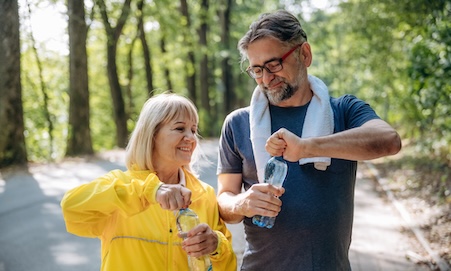With Grace has the honour and privilege of supporting individuals and families through some of life’s most tender moments. This work has shown us just how precious every day is. It’s a reminder to embrace life fully, to care for ourselves and each other, and to make the most of the time we have — not with fear, but with intention and love.
But of course, to be able to make the most of life you need to do all that you can to keep fit and well for as long as you can. And an essential part of that is keeping your body hydrated. Particularly when the weather is very hot as it is in the UK at the moment.
Let’s take a quick look at:
- Why is hydration important?
- What are the symptoms of dehydration?
- How to stay hydrated this summer – 5 things you can do.
Why is hydration important?
Hydration may well be something that you’ve never particularly thought about. Yet it is absolutely essential to many of our key bodily functions, including the blood system, digestive and waste systems, skin, joints, and eyes.
If we become dehydrated, not only does it affect these aspects of our physical health and wellbeing, but it can also cause us to struggle mentally, for example in terms of low mood, poor concentration or memory lapses.
Dehydration can cause particular problems in hot weather. When your body is dehydrated, it stores more heat which then lowers your ability to cope with hot temperatures and put you at increased risk of heat-related conditions such as heat stroke. It’s particularly important to stay hydrated in hot weather as this helps you to produce sweat and cool your body down.
What are the symptoms of dehydration?
As well as knowing why hydration is important, you need to be able to recognise the symptoms of dehydration in yourself and others. A seemingly obvious one is feeling thirsty. However, it’s possible for the body to become dehydrated without feeling thirst, particularly in older adults.
Other symptoms of dehydration include:
- feeling dizzy or lightheaded;
- feeling tired;
- dry mouth, lips or tongue;
- peeing less often than usual;
- pee that is dark yellow and/or strong-smelling.
It is far better to prevent dehydration than deal with the symptoms of it. So here are five things that you can do to prevent dehydration.
Five things you can do to keep hydrated
Preventing dehydration is simple enough. It may just require a shift in daily habits to make it a priority. These five steps will help you do this.
-
Drink regularly
- Drink regularly throughout the day, including when you first wake up, as we lose water during the night from sweating. Many health experts recommend that we should drink around 2 litres of fluid a day, which equates to around eight mugs of fluid. Plain water or squash is best, but tea and coffee also count. You should increase this amount in hot weather or if you are doing physical activity and exercise.
-
Limit alcohol intake
- Whilst drinking regularly is important, it is wise to limit alcohol intake during hot weather as it is a diuretic, which means that it makes you urinate more often, which can cause you to become more dehydrated. So if you do fancy a cold beer or glass of wine on a hot day, it’s best to limit the amount and also alternate alcoholic drinks with water or other soft drinks to ensure that you stay hydrated.
-
Choose food with a high water content
- As well as drinking fluids, it’s helpful to choose food with a high water content. Five examples of this are:
- Fruit, for example melon, strawberries, pineapple and apples.
- Vegetables, for example cucumbers, tomatoes, spinach, mushrooms, broccoli.
- Soups, particularly those made with water-rich vegetables.
- Jelly.
- Yoghurt.
-
Check your pee
- A helpful way to keep an eye on your hydration levels during the day is to check your pee. It should be a pale, clear colour. If it’s yellow, you are showing signs of dehydration and need to drink more.
-
Replace essential body salts and minerals
- If you are becoming dehydrated, sometimes drinking fluids on their own is not enough. If you have not been drinking enough, this can lead to an imbalance of vital salts and minerals – known as electrolytes – in your bloodstream. This can cause you to feel headachy or fatigued. For a quick fix, try a small, salty snack. But a better option is to get a sachet of rehydration powder from a pharmacy which you mix with water and drink.
We hope that the above tips help you to stay hydrated, particularly during the hot weather season, and to remain fit and well to make the most of all life has to offer.



 Lines open now.
Lines open now.
